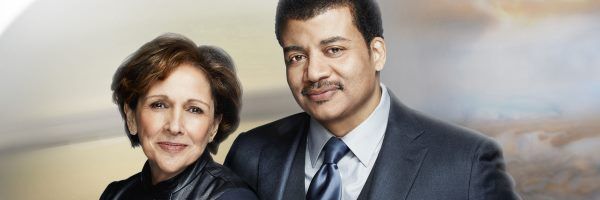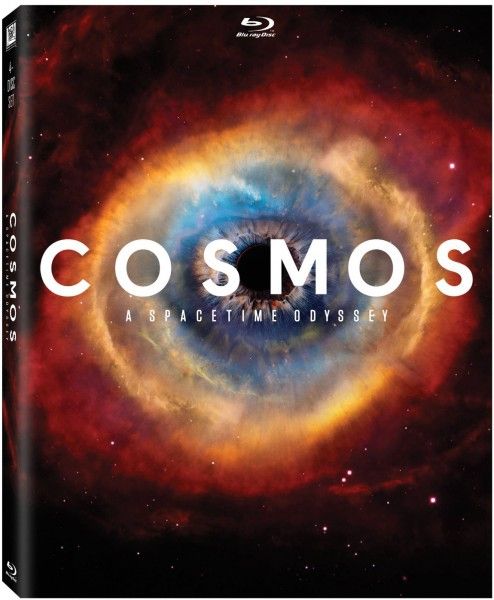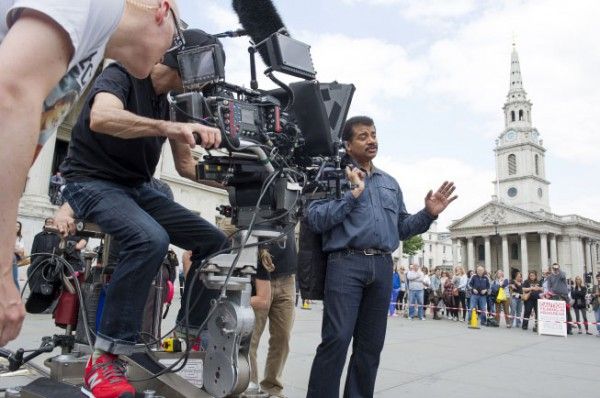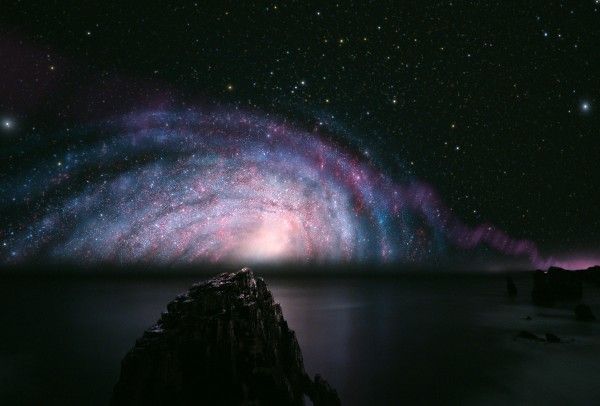More than three decades after the debut of Carl Sagan’s groundbreaking and iconic series, Cosmos: A Personal Voyage, host and astrophysicist Neil deGrasse Tyson is exploring the infinite expanse of the universe in Cosmos: A SpaceTime Odyssey, which just completed its epic 13-episode run on Fox. The special 4-disc Blu-ray set, which is currently available in stores, includes a full two hours of extras, including a mini-documentary featuring behind-the-scenes coverage on the making of the show.
During this recent exclusive phone interview with Collider, Dr. Neil deGrasse Tyson talked about showing people that reality programming on TV can be educational and fun, having over 2 million Twitter followers, why educators should meet their students wherever they are, instead of waiting for them to meet half-way, the use of science in film, his most memorable experiences from being a part of Cosmos, whether there might be a Season 2, and what he hopes people ultimately take away from the Cosmos experience. Check out what he had to say after the jump.
Collider: You’ve said that you think it would be cool if Cosmos redefined the meaning of reality television, so does getting nominated for Best Reality Series and Best Reality Host, especially when you’re the only non-competition show host in the category, at the Critics’ Choice Awards help that along a little bit?
NEIL deGRASSE TYSON: I guess. I’m not totally up on television awards themselves. I get wind of it, here and there. But, I’m flattered when Cosmos shows up in a category. We’re up against Duck Dynasty. If Cosmos loses, okay. But, if it loses to Duck Dynasty, what does that mean? And I watch Duck Dynasty. That show has got some personality, I’ll tell you that. I don’t want to take away from shows that have their own following and have created their own world. I just don’t know what it would mean if Duck Dynasty wins and Cosmos doesn’t.
What’s it meant to you, to be a part of a show like this and to show people that reality TV doesn’t have to be about housewives or bachelors or talent competitions, and that educational programming can be fun and interesting?
TYSON: That’s a great question. In a free market, put whatever on TV that people watch. I’ve never been the critic of reality TV that others have, especially many of my colleagues who wonder if it’s just the end of America. No, it’s a free market and you just put it on. The fact that science has not been on neck-and-neck with it means that people believe science could not compete on that level. Cosmos has, in this weeks, been in the same sentence as Game of Thrones. That’s extraordinary. “Cosmos lost a few points to Game of Thrones in the ratings.” Wow, we’re in the same sentence as Game of Thrones, and we’ve been in the same sentence as The Walking Dead. You can talk about the ratings going up and down, but we’re talking about a science program in primetime, on a major network on Sunday night when everybody is home. The fact that it is even in the conversation is extraordinary unto itself, and I don’t think anyone should lose sight of that fact.
You consider yourself a scientist and an educator, but you’ve also become something of a rock star on TV and through social media, and you have over 2 million followers on Twitter.
TYSON: It’s gotta be a mistake! I keep reminding people, “I’m an astrophysicist. This is your change to back out. Do you think this is Mike Tyson? What were you thinking?!” I think it’s evidence that perhaps everyone, but certainly more than anyone expected, have some inner geek. Everyone might have a little bit of an inner geek that can be ignited, or maybe it’s an ember that needs to be fanned so that it can gain flame again. I’ve seen so many people responding, “I never knew I could like science,” or “I never thought I was good at science.” So many people have that kind of attitude and approach to learning that it gives me great hope for the world. Wait, I should clarify that to say hope, in the sense that innovations in science and technology will be the engines of a 21st century economy and I don’t want to go broke, as a nation. So, the hope I have is that, if people embrace it, we’ll have a healthier, more secure, wealthier nation than we have now.
I’ve always felt that anytime someone says that a subject is boring or they don’t get it or they don’t understand it, it’s because they haven’t had the right teacher or right presentation of it yet.
TYSON: I got in trouble because I put out a tweet that said, “Odd that a teacher is more likely to say, ‘These students just don’t want to learn,’ than they are to say, ‘I suck at my job.’” You’ve never heard a teacher say, “I suck at my job,” so the blame goes to the student and not the teacher. And then, other people said, “That’s easy for him to say ‘cause he’s never taught,” because they clearly didn’t look at my resume. They assume it because they don’t want what I said to be true. So, as an educator, I think educators should meet the people wherever they are. Don’t even ask them to come half-way. Find them where they are, and sit on a couch with them. Then, you’ve made 90% of the journey to reaching them. I’d like to think that Cosmos is on the couch with you while you’re watching it.
You’ve also had some things to say about the use of science in film. Are you able to enjoy films that have depictions that are less than accurate?
TYSON: I’m not crazy like that. Whatever I am, I’m not as bad as the person that read the novel before they see the film. We know those people, don’t we? They sit there and go, “Oh, that didn’t happen in the book. They blended three characters into one.” Shut up! Just never watch a movie, ever again. Read your novels and don’t go to the theater. I’m not like that. I sit down and enjoy the film. I’ll enjoy whatever they’re putting in front of me. If they made an attempt to get things right, then I’ll criticize them for what they got wrong. If they made no attempt to get things right, and yet they stumble on something that’s right, I’ll comment on what they got right. You have to earn the right for me to care about whether you even got it right. I’m not criticizing the science in Star Wars. That’s a waste of everybody’s time. But the film Gravity put in a lot of effort to make an authentic film, so I thought I’d comment on it.
You’ve talked about there being profound areas of scientific ignorance that you’d love to see solved before you die. What’s on the top of that list for you?
TYSON: That’s a double-edged sword because when you solve a problem, you’re often standing in a new place with a question you didn’t even think to ask. So, the problem I want to see solved is the one that arises, that I now ask a question about, after I solve the problems that we now have. It’s the question that is yet to be asked. That’s what I long to know. It’s unknowable because once something is answered, then there’s another question. Hence the eternal quest.
Do you have a favorite or most memorable experience from doing this show?
TYSON: My favorite location was Iceland. That should be renamed Volcano-land. It’s all volcanos. It’s this crazy, volcanically active island. Iceland was a stand-in for us, for primordial Earth. If your country can be primordial Earth, that’s a great country. So, that was fun. I enjoyed visiting Isaac Newton’s birthplace in Lincolnshire, in the U.K. That was a little bit of a pilgrimage for me because he’s a big hero of mine. I also liked all of the scenes filmed on the Ship of the Imagination. Of course, it was all green screen, but it was fun saying, “Yeah, we’re nearing the sun right now.” I put it all in my head, and that was just fun.
Since science with be forever ongoing, did 13 episodes feel like you got to tell and explore a good amount of what you were hoping to achieve with this?
TYSON: Yes, it was the right number of episodes for us to be nearly dead, at the end. I don’t know that we had energy left, at the end of it. People ask, “When are you going to do a Season 2?,” and I’m like, “Can you let this one breathe for a minute?” Not that I’ve ever been female, but I’m imagining and extrapolating that, right after you give birth, it’s the wrong time to ask a woman, “Wanna have another kid now?” So, I need more time before I even address that question.
When you do a show like this, knowing that you’ll be exploring things that a lot of people know nothing about, was it a priority for everyone involved to really try to make the information easier for everyone to understand?
TYSON: That’s always the case, but you don’t want to make it so easy that it’s trivial. The goal was to also trust the visualization because those could be stunning. For example, there’s a whole sequence where I’m describing how hot the sun is and what it’s doing on its surface, but you see that out the front window, so we took out all those words. Once you know the visuals can rise to the occasion, you can de-word something. It’s the juxtaposition to the music, the visuals, the script and my delivery. When you combine all of that, that is the show. It all comes together to tell exactly the story we need to tell. We didn’t pull any punches on the episode about Spectra and the formation of Spectra. This airing of Cosmos, in primetime and on network, might be the most educational thing that has ever aired in primetime, on a network.
What do you think needs to and should be done to really keep a conversation going about the world of science?
TYSON: Nowadays, everyone talks to one another through the blogosphere and comment threads, and the like. Cosmos has already been heavily discussed and talked about because it’s actively airing now. In six months or a year, if people are still talking about it, then we’ll know that it’s had some impact. But, it’s not a mystery whether something is having an impact because you can watch people reference it. And now, they have the Blu-ray. Also, National Geographic can re-air the show 60 times, so it will be on. It’s the first run that everyone is excited about, but it will be with us for years to come, in reruns. By the way, it was also aired in 181 countries.
What do you hope people ultimately take away from the experience of watching Cosmos?
TYSON: I want them to know that science surrounds you. It’s not something that you can step aside, step over or push out of your way because you were never good at science in school. Science is around you. Once you know and embrace that fact, it might stimulate curiosity within you to learn more about the natural world. Knowledge of the natural world and how it works should be counted as fundamental to informed governance. You can’t have a functioning democracy, if the electorate is under-informed or, worse, mis-informed. So, I’d like people to embrace what science is and what it is, how it works and why it works, and embrace how scientists come to reveal what our place is, in the universe.
Cosmos: A Spacetime Odyssey is now available on Blu-ray/DVD.




